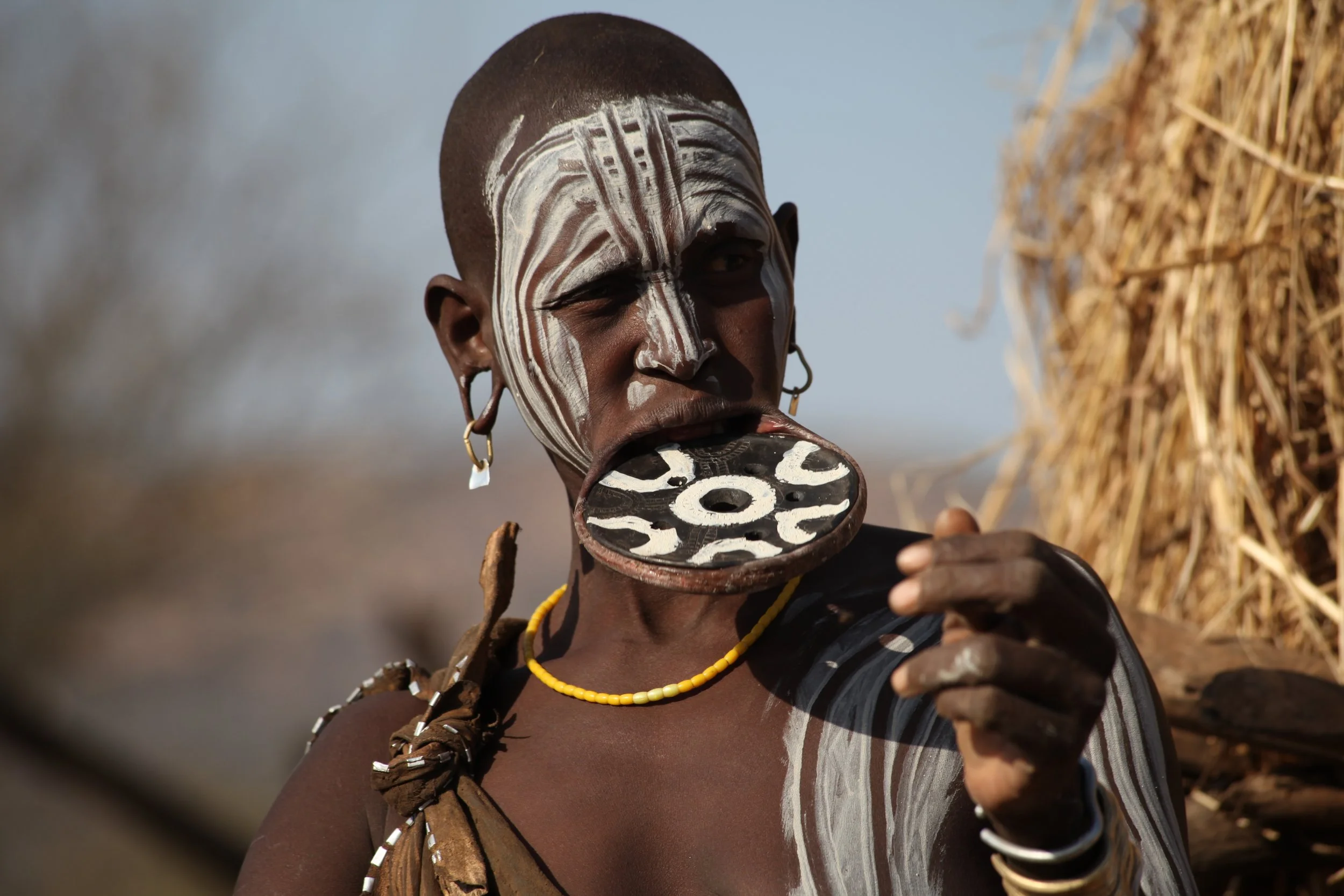
FRAMING THE OTHER
THE STORY.
The Mursi tribe lives in the basin of the Omo River in the south of Ethiopia. The women are known for placing large plates in their lower lips and wearing enormous, richly decorated earrings. They have recently been discovered by Western tourists: large groups come to see the unusually adorned natives in real life. Posing for camera-toting visitors has become the main source of income for the Mursi. To make more money, they embellish their “costumes” and finery in such a manner that less of their original authentic culture remains.
Framing the Other is a documentary film that contrasts the views of Mursi women and those of a group of Dutch tourists as they prepare themselves for a meeting. While one is looking forward to an authentic experience with the exotic other, the Mursi women are busy looking as exotic as possible. The more exotic, the more they are photographed and the more they earn. This humorous and at the same time disruptive film shows the destructive impact tourism has on traditional communities.
THE TRAILER.
This film can be watched in full on Guidedoc.tv (Spanish and Dutch subtitles).
For a version with English subtitles drop me a message.
THE PRODUCTION.
There are a few moments that profoundly changed the course of my life. And making Framing the Other is definitely one of them. In fact, I never thought I'd become a full-on documentary filmmaker, and it wasn't my ambition to start with. But when I set out to Ethiopia as a tour guide with a group of tourists and witnessed the Mursi community and their interactions with tourists, it all became clear: this story needed to be told through film. My background in anthropology and tourism studies helped me in framing the narrative, but it was mostly my empathy for the Mursi and their vulnerable situation that led me to make my first film.
The film was part of my master's study Tourism Impact at Wageningen University. Together with fellow student and companion Ilja Kok we decided to make a film about the destructive impact that tourism can have. Initially only as a thesis to be able to graduate, but the film also turned out to be a huge success outside the university gates. The film eventually screened at more than 100 film festivals worldwide and won multiple awards.
When I started travelling to festivals and engaged in discussions about the film, I gradually started to understand the power that film can have in influencing people's views and values. And that power comes with great responsibility when portraying others. This is something that I keep in the back of my mind with every new film I make. To this day I am very proud and grateful of the impact of this film and of the sudden turn I took when pursuing a career in tourism.
My role
Together with companion Ilja Kok, we directed, produced and financed the film entirely ourselves.
Release
March 2012 | OneWorld Intl. Human Rights Film Festival, Czech Republic
Awards
Audience Award | One World Human Rights Film Festival, Czech Republic
Best Film Award | Intimate Lens Ethnographic Film Festival Caserta, Italy
Best Short Doc Award | Fargo Film Festival, USA
Audience Award | Three Elements Travelers & World Film Festival, Poland
Audience Award | Scenecs International Debut Film Festival, the Netherlands
Award for Best Director | Bir Duino Human Rights Film Festival, Kyrgyzstan
Silver Horseshoe Award | Asterfest International Film Festival, Macedonia
Grand Prix Award best documentary film | Montenegro Film Festival
NTR Special Mention | Go Short International Short Film Festival, the Netherlands
Length
25 minutes
Film locations
Ethiopia & the Netherlands
Year of production
2010 - 2011
Production house
Copper Views Film Productions
More info on
www.copperviews.com

“I am curious te see how they live. Maybe we can have a cup of coffee with each other.”
THE MEDIA.
Framing the Other gained a lot of attention during its film festival tour. Apart from news articles and reviews by film critics that were released, two media releases are dear to me to this day. In 2013 I travelled to the Margaret Mead Film Festival in New York. The film was screened alongside David O'Rourke's Cannibal Tours (1988), a film that was an enormous source of inspiration for Framing the Other. After the screening I was interviewed about the film process and the impact it has made. The podcast can be heard here. In addition, academic journal American Anthropologist wrote an extensive article on the importance of the film in academic spheres, with our film as a case study. The article can be read here.










